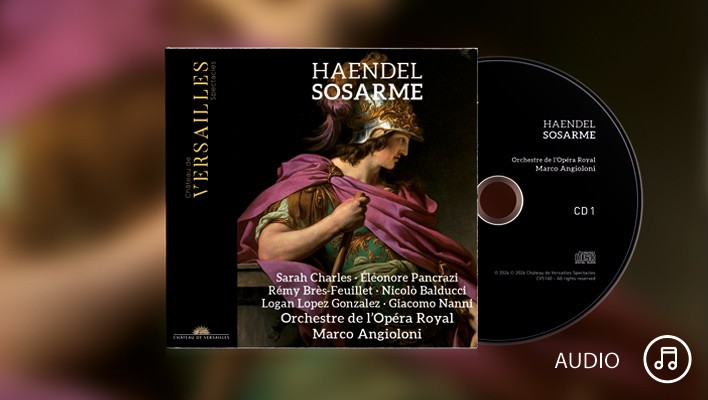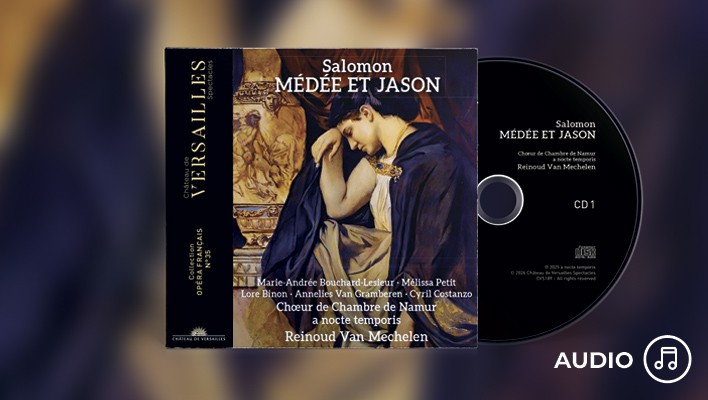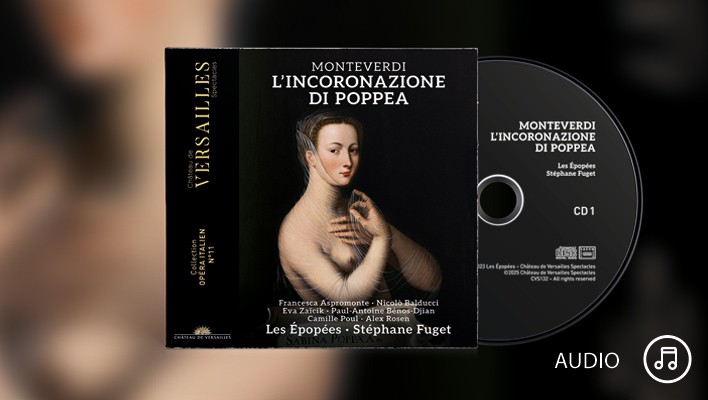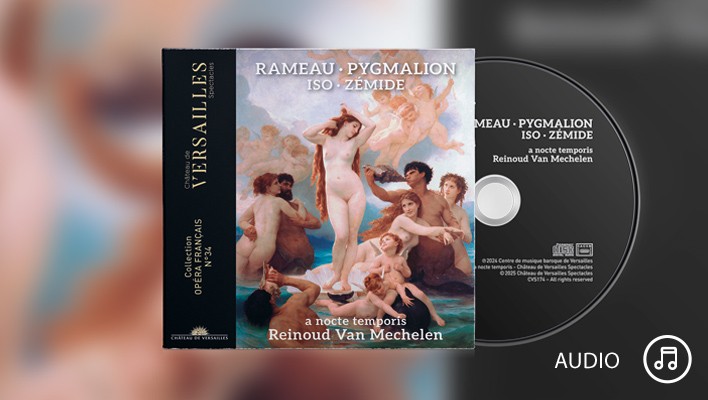Opera in concert version

43 products

Handel : Sosarme
In mythical Lydia, Prince Melo rebels against his father, and Sosarme steps in to restore peace. Handel blends text and music, balancing tradition and innovation, with Marco Angioloni delivering a vibrant Sosarme.

Salomon : Médée et Jason
Medea is reimagined as a free and sovereign heroine. Pellegrin and Salomon’s innovative lyric tragedy stands between Lully and Rameau. Reinoud Van Mechelen reveals its full dramatic power.

L’Incoronazione di Poppea
Poppaea, Nero’s mistress, wields manipulation and cruelty to attain power, orchestrating intrigues and deaths around her. Under Monteverdi’s music and Stéphane Fuget’s direction, her rise becomes a mesmerizing celebration of limitless desire and ambition.

Pygmalion - Zémide
This programme brings together Rameau’s Pygmalion and Pierre Iso’s Zémide, two works where love asserts its power with both intensity and delicacy. Under the inspired direction of Reinoud Van Mechelen, Baroque music and emotion intertwine in a dazzling, expressive performance.

Ernelinde - Princesse de Norvège
Ernelinde - Princesse de Norvège
Princess Ernelinde, torn between her love for King Sandomir and her duty to her father, finds herself at the heart of a lyrical tragedy. Philidor's innovative composition foreshadows Gluck's reforms. Under the direction of Martin Wåhlberg, this opera, forgotten for two centuries, is brought back to life.

Atalia
After eliminating the royal family, Atalia takes control of Jerusalem. Seven years later, the High Priest and his allies restore the young Joas to the throne. Emmanuel Resche-Caserta and Ensemble Hemiolia bring this powerful oratorio to life, where justice and innocence ultimately prevail.

Alceste ou Le Triomphe d'Alcide
Alceste ou Le Triomphe d'Alcide
In 1674, Lully and Quinault premiered Alceste, a tragic opera that blends Greek mythology with Baroque style, which was met with success at the court of Louis XIV. The opera played a key role in establishing tragic opera as a major genre. Stéphane Fuget, with Les Epopées and the Chœur de l’Opéra Royal, masterfully brings this world of love and sacrifice to life.

Suite d'Armide ou Jérusalem Délivrée
Suite d'Armide ou Jérusalem Délivrée
Suite d'Armide or Jerusalem Delivered, composed by Regent Philippe d'Orléans and first published in 1704, showcases exceptional musical talent. Leonardo García Alarcón and Cappella Mediterranea masterfully bring this largely forgotten genius to life.

Giulietta e Romeo
Who was not seized by the love of Romeo and Juliet? Napoleon, that great man of war, was no exception. Franco Fagioli and Adèle Charvet reunite the formidable duet of the castrato Crescentini and the adored Grassini in this opera made by Zingarelli as a tribute to this unknown Bonaparte, lover of Italian opera.

Lully - Armide
Armide was Lully and Quinault's last lyric tragedy, and is considered their greatest dramatic achievement. Vincent Dumestre conducts this spellbinding masterpiece, buoyed by Stéphanie d'Oustrac's masterful interpretation.

Les Fêtes Grecques et Romaines
Les Fêtes Grecques et Romaines
From its premiere in 1723, Les Fêtes grecques et romaines - Colin de Blamont's first opera - was a great success, bringing to life the most famous feasts of ancient history. Valentin Tournet invites us to rediscover this seminal work of the Age of Enlightenment, too long overshadowed by its famous contemporaries.

L'Olimpiade
In his Olimpiade, Cimarosa brings heroism to the athletes who compete in Olympia during the Games. Christophe Rousset, a great champion of the late 18th-century Italian repertoire, carries off a dazzling cast in this bel-cante hurricane!

Télémaque & Calypso
On the island of Ogygie at the end of the world, the nymph Calypso attempts to seduce the handsome castaway Telemachus, son of Ulysses... Continuing their exploration of Destouches' works, Margaux Blanchard and Sylvain Sartre pay a brilliant tribute to this adventure-filled Homeric epic.

Haendel - Poro, re delle Indie
Haendel - Poro, re delle Indie
This is Haendel at the height of his fame, recounting the heartbreak and clash of arms of the Great Alexander and the reckless Poro. In an edition that would have delighted the composer himself, young tenor Marco Angioloni breathes new life into this vocal whirlwind.

LES GENIES
Mademoiselle Duval, a singer and composer, created the opera "Les Génies" in 1736, enjoying considerable success with nine performances at the Parisian Académie Royale de Musique, thus becoming the second woman, after Elisabeth Jacquet de la Guerre, to compose an opera for this institution.

CEPHALE ET PROCRIS
In 1694, Elisabeth Jacquet de La Guerre became the first woman to compose a French opera, creating a work that tells the tragic fate of the Greek lovers Cephalus and Procris, thus marking an exceptional act of freedom for a woman at that time.

LULLY - ATYS
Atys, a lyrical masterpiece of the Grand Siècle, intertwines love and tragedy, acclaimed by Louis XIV himself. Lully's virtuoso notes enhance Quinault's dazzling text, offering an enchanting reinterpretation under the passionate direction of Christophe Rousset.

Echo & Narcisse - Gluck
Hervé Niquet and the Concert Spirituel brilliantly resurrect Gluck's ultimate work. This work, once scorned for its pastoral style, is a tribute to the splendour of the French tradition. A refined work finally brought out of oblivion.

Héroïnes - French cantatas
From the enchanting Armide to the valiant Clorinda, Camille Delaforge invites us to explore the great musical epics of the 17th and 18th centuries. French cantatas and lyric tragedies celebrate these powerful and fascinating female heroines.

By the fire we make love - Gallant airs
By the fire we make love - Gallant airs
Charpentier, the poet musician with exquisite refinement, created a labyrinth of amorous and festive songs that charmed the intimate circles of the Bourgeoisie and the Court of Louis XIV. Under the direction of Stéphane Fuget, the cream of French singing restores these gems to their original glory.

Handel : Sosarme
In mythical Lydia, Prince Melo rebels against his father, and Sosarme steps in to restore peace. Handel blends text and music, balancing tradition and innovation, with Marco Angioloni delivering a vibrant Sosarme.

Salomon : Médée et Jason
Medea is reimagined as a free and sovereign heroine. Pellegrin and Salomon’s innovative lyric tragedy stands between Lully and Rameau. Reinoud Van Mechelen reveals its full dramatic power.

L’Incoronazione di Poppea
Poppaea, Nero’s mistress, wields manipulation and cruelty to attain power, orchestrating intrigues and deaths around her. Under Monteverdi’s music and Stéphane Fuget’s direction, her rise becomes a mesmerizing celebration of limitless desire and ambition.

Pygmalion - Zémide
This programme brings together Rameau’s Pygmalion and Pierre Iso’s Zémide, two works where love asserts its power with both intensity and delicacy. Under the inspired direction of Reinoud Van Mechelen, Baroque music and emotion intertwine in a dazzling, expressive performance.

Ernelinde - Princesse de Norvège
Ernelinde - Princesse de Norvège
Princess Ernelinde, torn between her love for King Sandomir and her duty to her father, finds herself at the heart of a lyrical tragedy. Philidor's innovative composition foreshadows Gluck's reforms. Under the direction of Martin Wåhlberg, this opera, forgotten for two centuries, is brought back to life.

Atalia
After eliminating the royal family, Atalia takes control of Jerusalem. Seven years later, the High Priest and his allies restore the young Joas to the throne. Emmanuel Resche-Caserta and Ensemble Hemiolia bring this powerful oratorio to life, where justice and innocence ultimately prevail.

Alceste ou Le Triomphe d'Alcide
Alceste ou Le Triomphe d'Alcide
In 1674, Lully and Quinault premiered Alceste, a tragic opera that blends Greek mythology with Baroque style, which was met with success at the court of Louis XIV. The opera played a key role in establishing tragic opera as a major genre. Stéphane Fuget, with Les Epopées and the Chœur de l’Opéra Royal, masterfully brings this world of love and sacrifice to life.

Suite d'Armide ou Jérusalem Délivrée
Suite d'Armide ou Jérusalem Délivrée
Suite d'Armide or Jerusalem Delivered, composed by Regent Philippe d'Orléans and first published in 1704, showcases exceptional musical talent. Leonardo García Alarcón and Cappella Mediterranea masterfully bring this largely forgotten genius to life.

Giulietta e Romeo
Who was not seized by the love of Romeo and Juliet? Napoleon, that great man of war, was no exception. Franco Fagioli and Adèle Charvet reunite the formidable duet of the castrato Crescentini and the adored Grassini in this opera made by Zingarelli as a tribute to this unknown Bonaparte, lover of Italian opera.

Lully - Armide
Armide was Lully and Quinault's last lyric tragedy, and is considered their greatest dramatic achievement. Vincent Dumestre conducts this spellbinding masterpiece, buoyed by Stéphanie d'Oustrac's masterful interpretation.

Les Fêtes Grecques et Romaines
Les Fêtes Grecques et Romaines
From its premiere in 1723, Les Fêtes grecques et romaines - Colin de Blamont's first opera - was a great success, bringing to life the most famous feasts of ancient history. Valentin Tournet invites us to rediscover this seminal work of the Age of Enlightenment, too long overshadowed by its famous contemporaries.

L'Olimpiade
In his Olimpiade, Cimarosa brings heroism to the athletes who compete in Olympia during the Games. Christophe Rousset, a great champion of the late 18th-century Italian repertoire, carries off a dazzling cast in this bel-cante hurricane!

Télémaque & Calypso
On the island of Ogygie at the end of the world, the nymph Calypso attempts to seduce the handsome castaway Telemachus, son of Ulysses... Continuing their exploration of Destouches' works, Margaux Blanchard and Sylvain Sartre pay a brilliant tribute to this adventure-filled Homeric epic.

Haendel - Poro, re delle Indie
Haendel - Poro, re delle Indie
This is Haendel at the height of his fame, recounting the heartbreak and clash of arms of the Great Alexander and the reckless Poro. In an edition that would have delighted the composer himself, young tenor Marco Angioloni breathes new life into this vocal whirlwind.

LES GENIES
Mademoiselle Duval, a singer and composer, created the opera "Les Génies" in 1736, enjoying considerable success with nine performances at the Parisian Académie Royale de Musique, thus becoming the second woman, after Elisabeth Jacquet de la Guerre, to compose an opera for this institution.

CEPHALE ET PROCRIS
In 1694, Elisabeth Jacquet de La Guerre became the first woman to compose a French opera, creating a work that tells the tragic fate of the Greek lovers Cephalus and Procris, thus marking an exceptional act of freedom for a woman at that time.

LULLY - ATYS
Atys, a lyrical masterpiece of the Grand Siècle, intertwines love and tragedy, acclaimed by Louis XIV himself. Lully's virtuoso notes enhance Quinault's dazzling text, offering an enchanting reinterpretation under the passionate direction of Christophe Rousset.

Echo & Narcisse - Gluck
Hervé Niquet and the Concert Spirituel brilliantly resurrect Gluck's ultimate work. This work, once scorned for its pastoral style, is a tribute to the splendour of the French tradition. A refined work finally brought out of oblivion.

Héroïnes - French cantatas
From the enchanting Armide to the valiant Clorinda, Camille Delaforge invites us to explore the great musical epics of the 17th and 18th centuries. French cantatas and lyric tragedies celebrate these powerful and fascinating female heroines.

By the fire we make love - Gallant airs
By the fire we make love - Gallant airs
Charpentier, the poet musician with exquisite refinement, created a labyrinth of amorous and festive songs that charmed the intimate circles of the Bourgeoisie and the Court of Louis XIV. Under the direction of Stéphane Fuget, the cream of French singing restores these gems to their original glory.
